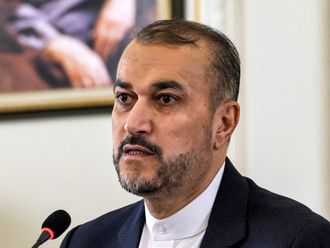Moscow: Western diplomats are increasingly saying that President Bashar Al Assad keeping power is a better option for Syria than the country being ruled by Islamist militants, Russia’s foreign minister was quoted as saying on Friday.
“Not only in private meetings but also in public comments, the idea is occurring to some Western colleagues that ... Al Assad remaining in office is less of a threat for Syria than a takeover of the country by terrorists,” Sergei Lavrov told RIA news agency in an interview published on Friday.
Russia has been Al Assad’s most important supporter during Syria’s civil war. It says his removal from power must not be a precondition for holding peace talks.
In Geneva, the UN-Arab League Syria envoy Lakhdar Brahimi met with US and Russian delegations to try to agree which nations should be invited to Syria peace talks in Geneva next month.
Russian Deputy Foreign Ministers Mikhail Bogdanov and Gennady Gatilov, whose country is Syria’s main ally, and US Under Secretary of State for Political Affairs Wendy Sherman were meeting with Brahimi in Geneva.
They also planned to expand the meeting to include diplomats from Britain, China and France - the other three permanent members of the 15-nation UN Security Council - and from Syria’s neighbours, who have been struggling to cope with the conflict and the more than 2.3 million Syrian refugees.
Russia’s foreign ministry said in a statement Friday that Bogdanov, who is the Russian president’s special envoy for the Middle East, met a day earlier with the Western-backed Syrian National Coalition’s Secretary General Badr Jamous and other coalition officials.
The head of the rebel Free Syrian Army, once the country’s strongest armed opposition force but now increasingly marginalised, said Friday he is working to unify rebel ranks.
“The Supreme Military Council [of the FSA] reassures everyone that it is working... with the aim to prevent division [in rebel ranks], to unify ranks and to bring together all the fighters on the ground who believe in the Syrian people’s revolution,” General Selim Idriss said in a video published Friday.
“We consider that all those who fight against the criminal regime of Bashar [Al Assad] are our brothers, and we call on all revolutionary leaders to unify in the face of oppression.”
Idriss’s statement comes at a time when the moderate, Western-backed FSA is weaker than ever, as Islamists and jihadists have increasingly taken centre stage in the rebel camp.
Two weeks ago, rebels from the recently formed but powerful Islamic Front captured the Supreme Military Council’s (SMC) depots on the border with Turkey.
The Islamic Front, formed on November 22, is an alliance of rebel fighters and its emergence was a blow to the SMC, which had previously been the main rebel formation.
Meanwhile, Opposition leader Ahmad Jarba said on Friday that Syria’s Kurds will send two delegations to upcoming peace talks, one with the opposition coalition and another with representatives of President Bashar Al Assad.
“The Kurds will participate in the Geneva meeting in two delegations,” Jarba, leader of the National Coalition, said during a visit to the Kawergosk Syrian refugee camp in Iraq’s autonomous Kurdistan region.
The Geneva 2 peace talks are scheduled to open in Montreux, Switzerland on January 22.
There will be “a delegation within the [opposition] coalition and a regime delegation,” Jarba said, without saying who was who.
But it seems likely that the Kurdish National Council (KNC), which is part of the opposition coalition, will attend with opposition representatives, while the People’s Council of Western Kurdistan (PCWK), which is seen as close to the regime, will accompany the government representatives.
The main group in the PCWK is the Democratic Union Party (PYD), which is the most powerful armed Kurdish organization in Syria.
The KNC and PCWK, the two main Syrian Kurdish groups, have been at odds since the latter announced last month a transitional autonomous administration for Kurdish-majority areas of northeastern and northwestern Syria without the former’s backing.
Since Tuesday, they have been holding talks in Arbil, the capital of Iraqi Kurdistan, aimed at establishing a unified front ahead of the talks.
“We held a series of meetings with our brothers in the People’s Council of Western Kurdistan, with the aim of unifying the Kurdish stance more and more,” KNC spokesman Nassereddin Ebrahim said.
Ebrahim said the goal was still for an independent Kurdish delegation, but if that does not happen, “we will speak with a shared vision,” and “the two delegations [will] represent the will of the Kurdish people in Syria, for the sake of a democratic Syria.”












